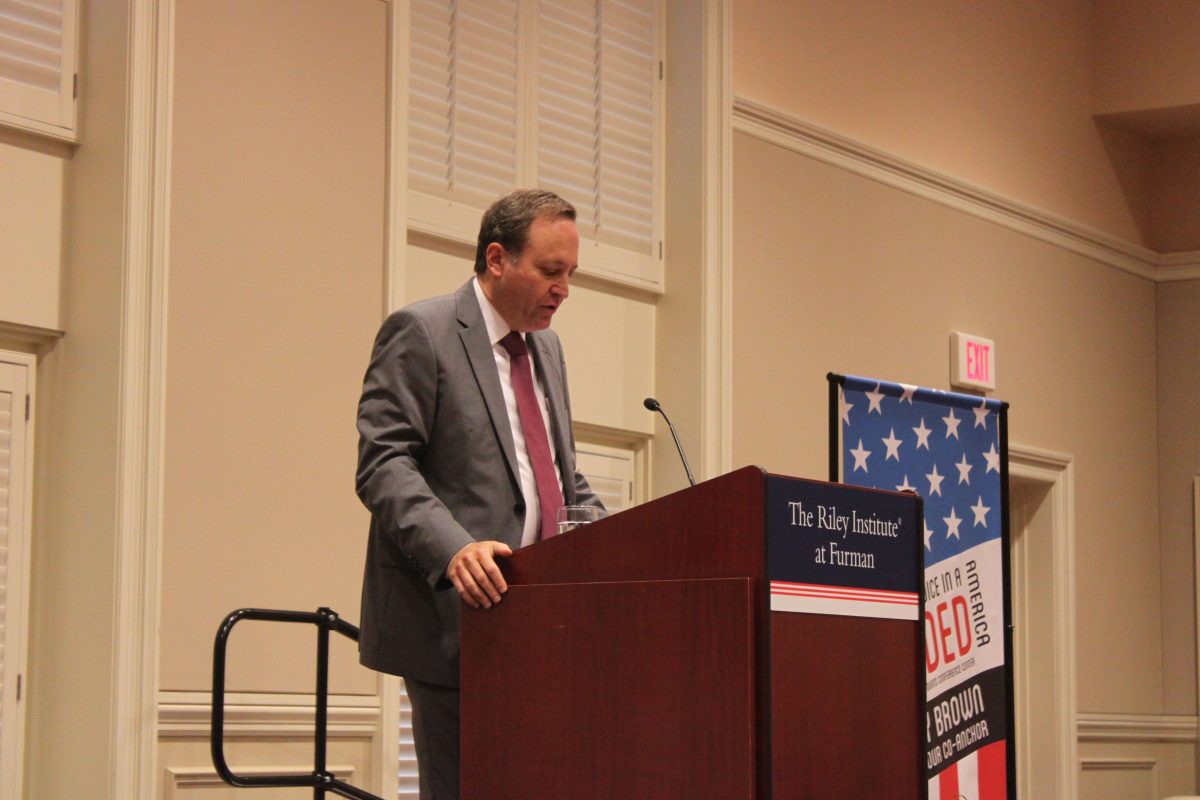Speaking to a capacity audience at the Younts Conference Center, Jeffrey Brown, Senior Correspondent for the flagship program NewsHour, underscored the important role that public broadcasting plays in an increasingly polarized America.
Brown was speaking under the auspices of the Woodrow Wilson Fellow in Residence series. His address, dubbed, “The Public Voice in a Divided America”, brought to light some of the technological changes and what they mean for public broadcasting and its place in the sphere of public political discourse.
Brown started by indulging the audience with a report he did in Wisconsin, which he believes is a microcosm of the current battle for the soul of America. While in Wisconsin, Brown was covering a story on the union battles that were going on up there. In his interview with an anti-union protester who wore a button emblazoned with the adage “Don’t Trust the Mainstream Media.”
While the irony of someone like that agreeing to be the subject of his interview was not lost on Brown, he also averred that this grassroots activism and engagement is the best thing about American politics.
“Although public perception is that partisan divide presents and insurmountable challenge to governing, there’s nothing wrong with partisan debate,” he said.
According to Brown, the partisan divide is most polarized at the legislative level, though most Americans are moderate.
Brown offered some unique insight as to why this problem persists in American politics. “From my vantage point, the polarization is quite real. Compromise, these days, seems to be a dirty word,” he said.
Brown, who is also the arts correspondent for NewsHour, told the audience, which was made up of both students and members of the Greenville community, that in speaking to retiring members of Congress, he has learned that they do not want to return to Congress because of the ugliness that seems to dictate business there these days.
Brown, whose 20 years at PBS have included work both behind and in front of the camera, was quick to add that he does not believe that people should completely let go of their beliefs. However, he emphasized that there are real problems in the country, and that solving these problems will require coming together.
In the age of new, interactive media, people get their news from an increasingly diverse set of sources. This is very unlike the situation half a century ago, when most Americans got their news from the three main broadcast networks. These days, people get their news from sources they agree with, he said. This, he believes, is where public broadcasting comes in.
Brown elucidated that the Internet Age is still young and we do not fully know the results or the outcomes of certain technological advancements. Brown used the young democracies in the Arab world as examples of the power that these new forms of traditional and social media have in influencing and shaping the courses that the world can take.
“Now more than ever, our culture needs public broadcasting to put certain voices in the public arena. These are the voices that tell us about the world that we live in,” he said.
These voices, he explained, were necessary to help society sidestep some of the narratives and stereotypes that we typically fall into.
Asked about Brown’s assertion that Americans are not as divided as their representatives are, Jack Kowalski, a junior from Burlington, VT said; “I personally don’t agree. Some people see the America they know slipping away, while others believe that a new America is being ushered in. Both sides love this country dearly and are obviously very passionate about the direction they believe that the country should be heading in. This leads to Americans electing leaders that reflect their sharply divided values.”
Brown’s visit comes at a time where polarizing attitudes in congress has deeply affected performance and public perception. This 112th session of congress is on track to have passed fewer than half the number of bills that the second least productive congress has. This has translated into this session having a record-low approval rating, less popular than America going communist (11%) and just as popular as Hugo Chavez (9%).
Jeffrey Brown is the 2012 Woodrow Wilson Fellow in residence, an exclusive club that includes Kevin Quigley, the President/CEO of the National Peace Corps Association, Wlodzemierz Cimoszewicz, former prime minister of Poland, and Madeline Kunin, former governor of Vermont and U.S. Ambassador to Switzerland.





































